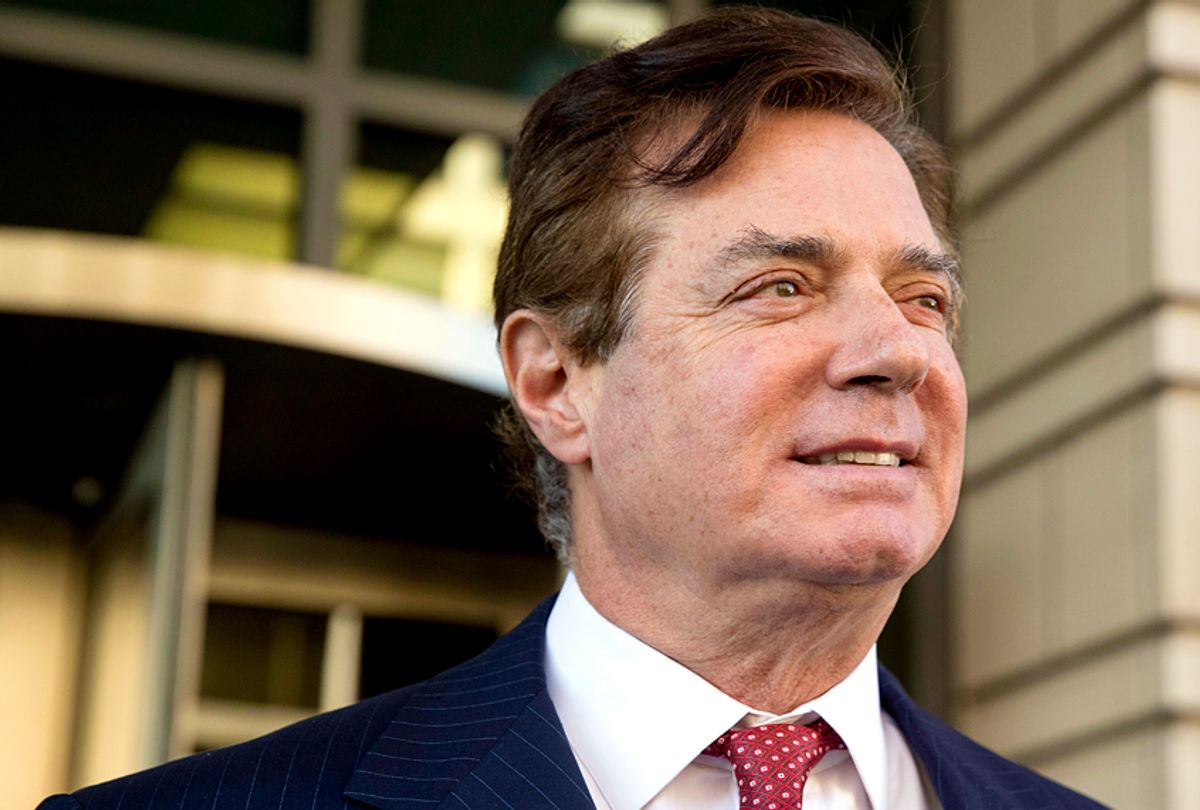Robert Mueller, the special counsel investigating allegations of collusion between President Donald Trump's 2016 campaign and the Russian government, submitted a response to former Trump campaign chairman Paul Manafort's sentencing memorandum late Tuesday.
In a 17-page court filing submitted to the U.S. District Court in Virginia, Mueller pushed back against Manafort's assertion that he has accepted responsibility for his crimes and deserves a reduced sentence, arguing that the longtime Republican consultant shows a "lack of remorse"
"The defendant blames everyone from the special counsel's office to his Ukrainian clients for his own criminal choices," the prosecutor wrote in a response to a filing from last week, in which Manafort argued for a "significantly" lower sentence for his conviction than the 19 to 24 year guideline he faces — essentially a life sentence for the 69-year-old Republican consultant who was found guilty of charges including tax and bank fraud.
Manafort had also argued that since the charges on which he was found guilty after his August trial were unrelated to Mueller's investigation into election interference, he should receive leniency from the judge. However, prosecutors pushed back on that argument in Tuesday's filing.
"Manafort suggests, for example, that but for the appointment of the special counsel’s office, he would not have been charged in connection with hiding more than $55 million abroad, failing to pay more than $6 million in taxes and defrauding three financial institutions of more than $25 million dollars," Mueller's team wrote.
Prosecutors also reiterated Manafort's criminal conduct and argued that even though Manafort admitted his guilt in his plea agreement in a separate case brought against him by Mueller in Washington, he was found by the judge there to have breached that plea agreement by lying to federal prosecutors, the FBI and a federal grand jury. Manafort reached that cooperation agreement with prosecutors to avoid a second criminal trial on separate charges in the nation's capital.
"He neither pled promptly nor provided complete and honest cooperation. He also has not paid back any of the taxes owed," prosecutors said. Manafort, according to the filing, owes the government millions of dollars in taxes but the government cannot "be sure of the full extent of Manafort's assets" because he never submitted a financial statement to any court, which prosecutors pointed out is "yet another example that he has failed to accept responsibility." They also said Manafort owes the U.S. Treasury over $6 million in taxes.
Manafort's attorneys have argued that the sentencing range of 19 to 24 years in prison is "clearly disproportionate" to his offenses as a first-time offender, failing health, age and low risk for reoffending. But in their sentencing memo, prosecutors stated that argued Manafort "poses a serious risk of recidivism," noting his "lies to the government and grand jury are aggravating factors and an additional basis for the denial of any reduction for the acceptance of responsibility."
"Here, a court has already found Manafort lied to the government and the grand jury," Mueller said. "That is not a basis for a lower sentence, but rather a more severe one."
Prosecutors also contended that Manafort was not experiencing the dire health problems he had claimed in previous filings and has failed to submit a report from a doctor or shown that the Bureau of Prisons is unable to treat his medical conditions.
"None of his prescribed treatments or medications indicates that his life is in any danger from a long period of incarceration," prosecutors wrote.
Manafort will be sentenced Thursday in Virginia by U.S. District Court Judge T.S. Ellis III. The Republican consultant also awaits a March 13 sentencing date in D.C. federal court by Judge Amy Berman Jackson after pleading guilty to conspiracy charges, lying to federal prosecutors and a grand jury in September 2018 and later breaching his cooperation agreement with the government.
Ellis and Jackson, the judges in the Virginia and Washington cases, will determine how Manafort will serve his prison time. Under the original plea deal, Mueller had agreed to recommend that Manafort serve his Washington sentence concurrent with his Virginia sentence. But after Manafort botched his cooperation agreement in the Washington case, Jackson may decide that Manafort should serve the sentences consecutively — a decision that will come in Manafort's second hearing. Mueller's prosecutors have so far not taken a position on what Manafort's sentence should be but they are expected to weigh in during the D.C. hearing on whether the sentences should be concurrent or consecutive.
Last November, Trump, speaking of a pardon for Manafort, said he "wouldn't take it off the table." At the time, Democratic Rep. Jerry Nadler of New York, the chairman of the House Judiciary Committee, warned Trump that "even dangling a pardon" for Manafort "would fortify a claim or charge of obstruction of justice." Most recently, Bloomberg News revealed New York state prosecutors are preparing to file criminal charges against Manafort in the event that he receives a presidential pardon.



Shares